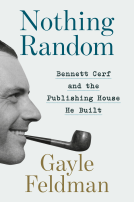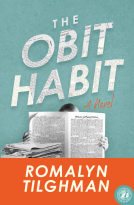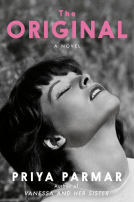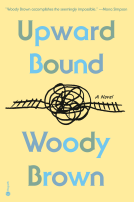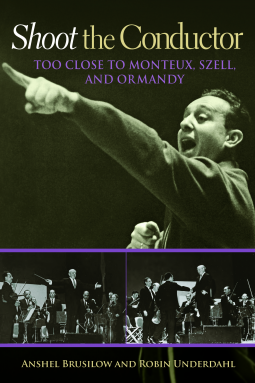
Shoot the Conductor
Too Close to Monteux, Szell, and Ormandy
by Anshel Brusilow and Robin Underdahl
This title was previously available on NetGalley and is now archived.
Send NetGalley books directly to your Kindle or Kindle app
1
To read on a Kindle or Kindle app, please add kindle@netgalley.com as an approved email address to receive files in your Amazon account. Click here for step-by-step instructions.
2
Also find your Kindle email address within your Amazon account, and enter it here.
Pub Date Jul 15 2015 | Archive Date Nov 15 2015
Description
This is an advance, uncorrected proof. Please check with publisher before quoting.
Anshel Brusilow was born in 1928 and raised in Philadelphia by musical Russian Jewish parents in a neighborhood where practicing your instrument was as normal as hanging out the laundry. By the time he was sixteen he was appearing as soloist with the Philadelphia Orchestra. He also met Pierre Monteux at sixteen, when Monteux accepted him into his summer conducting school. Under George Szell, Brusilow was associate concertmaster at the Cleveland Orchestra until Ormandy snatched him away to make him concertmaster in Philadelphia, where he remained from 1959 to 1966. Ormandy and Brusilow had a father-son relationship, but Brusilow could not resist conducting, to Ormandy’s great displeasure. By the time he was forty, Brusilow had sold his violin and formed his own chamber orchestra in Philadelphia with more than a hundred performances per year. For three years he was conductor of the Dallas Symphony, until he went on to shape the orchestral programs at Southern Methodist University and the University of North Texas.
Brusilow played with or conducted many top-tier classical musicians, and he has opinions about each and every one. He also made many recordings. Co-written with Robin Underdahl, his memoir is a fascinating and unique view of American classical music during an important era, as well as an inspiring story of a working-class immigrant making good in a tough arena.
A Note From the Publisher
Already entered second printing.
Advance Praise
“This is a book to be inhaled not just read.”--New York Journal of Books
"The writing in Shoot the Conductor is witty and readable."--Philadelphia Inquirer
“Don’t start reading this memoir by an inspired and inspiring concertmaster, conductor, and teacher too late in the evening, or you may not get much of a night’s sleep. I found it unputdownable, and read the whole book in one sitting. I don’t know which impressed me more: the profound dedication to music evident from first page to last, or the delightfully light and modest touch with which it’s presented. I learned a great deal, too, about the educational process that turns promise into achievement.”—Bernard Jacobson, music critic
"Here is a behind the scenes view of a professional musician's life. From his earliest experiences as a child prodigy, to a concert master of a great orchestra, a soloist and then conductor, Brusilow writes of his life in a very engaging style.”—Bernard Garfield, principal bassoon, Philadelphia Orchestra, retired
“I grew up listening to my father’s classical record collection. Szell, Monteux, Ormandy… these were our household idols. (My father trimmed his mustache after the style of Toscanini). Thank the gods of music, then, for Anshel Brusilow—for his robust humor, his sharp insight into character, and above all for his love of music and music-makers. In this wonderful memoir, the titans leave the podium and step down to earth, allowing us to observe through the eyes of Maestro Brusilow—seated only a few feet away in the concertmaster’s stand—their foibles, pettiness, tantrums, but also their greatness.”—Bill Marvel, writer for The Dallas Morning News and co-author of Islands of the Damned
“While carrying us along with information about these celebrities [Ormandy, Szell, and Monteux], Brusilow simultaneously gives us a good hard look at the day-to-day grim reality of the life of a professional musician.”—Wayne Gay, music critic, D Magazine
“Brusilow has a remarkable way of telling a story that is conversational and easy to read.”—Brian A. Shook, author of Last Stop Carnegie Hall: New York Philharmonic Trumpeter William Vacchiano (UNT Press)
Available Editions
| EDITION | Hardcover |
| ISBN | 9781574416138 |
| PRICE | $29.95 (USD) |
Average rating from 6 members
Featured Reviews
What a title! Right off you know that this person has a sense of humor and isn't afraid to use it.
I was quite riveted by this book. It is full of humorous antidotes, personal stories and juicy back stage insights. Brusilow drops the names of dozens of symphonic stars. I laughed out loud while reading. I also learned about the egos of musicians and the political reality that can make or break a career. Even great men have clay feet and ugly sides. Brusilow can appreciate the gifts of those he worked with but does not sugar coat anything.
A talented violinist, Brusilow studied under Efren Zimbalist at the Curtis Institute of Music and Dr. Szanto at the Philadelphia Musical Academy.When he saw Jascha Heifetz in concert he studied his staccato technique and learned to copy it. At sixteen he won a young conductor contest and then studied conducting under Pierre Monteux. He conducted the Philadelphia Orchestra in young peoples concerts and played at the Robin Hood Dell.
George Szell of the Cleveland Orchestra hired Brusilow to be his assistant concertmaster. Szell was precise and tyrannical in achieving the perfection he sought. Eugene Ormandy invited him to be concertmaster at Philadelphia, even holding the position open for a year. Ormandy allowed more personal freedom to the players. Brusilow formed a warm relationship with Ormandy. But Ormandy, like so many other musicians Brusilow describes, he could be vengeful if his wishes were countered.
Brusilow had to chose between violin performance and conducting. Ormandy did not want competition in the city, and he did not tolerate challengers for his position. Brusilow formed the Philadelphia Chamber Orchestra,conducting pieces written for smaller orchestras. Ormandy was not amused.
Finally Brusilow had to make a decision between performance and conducting. He sold his violin and turned down Zubin Mehta's offer to be his concertmaster. Then he turned down Seiji Ozawa's offer of assistant conductor and concertmaster. Finally the Dallas Symphony Orchestra offered him the position of conductor.
Brusilow started what in 1970 was the innovative blend of pop and orchestral music. His debut performance had Itzhak Perlman as soloist. Sadly the local music critic paned the performance. Musical friends told him they refused invitations from Dallas because "there's a music critic there who ruins careers." The Dallasound concerts drew crowds and were well received by the players. But that critic continued to pan the concerts. When the new "rock opera" Jesus Christ Superstar album came out Brusilow was the first to perform it concert style and sold 10,000 tickets.
A death brought changes to the board members. After taking the orchestra on tour in Latin America Brusilow returned to learn his contract had not been renewed.
His later career was in teaching and conducting at the Southern Methodist University and University of North Texas.
While reading the book I fondly recalled when I heard many of the stars he mentions in person or on television or recordings. I found the book accessible and interesting and not needing any more depth of knowledge than what I have. I better appreciate the challenges of a musical career, even for persons of talent and drive. Sharing some of the stories with my husband he thought Brusilow sounded pompous and arrogant, but I thought he came across as light hearted, sometimes clueless and naive, but willing to laugh at himself as well as at others. Becoming a conductor himself he realized that now he was the conductor his players would want to "shoot."

